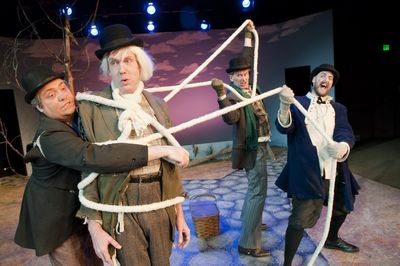Wait is over for ‘Godot’
Interplayers stages landmark play

Spokane theatergoers are a lot like the characters Estragon and Vladimir – they’ve spent an eternity waiting for “Godot.”
The Interplayers version that begins with a preview tonight is Spokane’s first professional production of “Waiting for Godot” for at least 20 years – and maybe the first ever.
That’s a surprising paucity for what’s widely considered to be the most significant play of the 20th century. The New York Times said this Samuel Beckett play “remade the world’s theater.”
The Interplayers version is directed by Karen Kalensky and features Reed McColm as Estragon and Jonn Jorgensen as Vladimir.
For all its acclaim, “Waiting for Godot” is most famous for being difficult to interpret.
Beckett’s 1952 absurdist “tragicomedy” is about two tramps waiting along the road for Godot. We never find out who Godot is; why they are waiting for him; or where he might be. Godot, it turns out, is notable mainly for failing to show up.
Here’s what the Irish Times said in 1956: “(Beckett) has achieved a theoretical impossibility – a play in which nothing happens, that yet keeps audiences glued to their seats. What’s more, since the second act is a subtly different reprise of the first, he has written a play in which nothing happens, twice.”
So, it’s not exactly a slap-happy farce (although it can be very funny). In fact, for such a famous play, it had an astonishingly short original Broadway run.
“The Oxford Companion to American Theatre” notes that the initial 1956 production ran only 59 performances, which still made it “one of the longest runs of any work of the theater of the absurd.”
Yet it has gone on to become one of the most debated plays in history. Scholars and audiences alike have argued it from every conceivable angle, most famously, “Who is Godot?”
One common theory holds that “Godot” is God, to which Beckett is said to have replied: “If by Godot I had meant God, I would have said God and not Godot.”
Beckett has also pointed out that he originally wrote the play in French, a language in which “Godot” doesn’t sound like “God.”
On top of that, the play has been interpreted from Freudian, Marxist, Jungian, Christian and existentialist viewpoints. Beckett’s language and plot leave plenty of room for all interpretations.
The 1956 New York Times review by Brooks Atkinson said, “The point of view suggests Sartre – bleak, dark, disgusted. The style suggests Joyce – pungent and fabulous. Put the two together and you have some notion of Mr. Beckett’s acrid cartoon of the story of mankind.”
That production featured Bert Lahr (better known as The Cowardly Lion) as Estragon. The Oxford Companion noted that his performance “was all the more remarkable in that he is reputed never to have understood a word he was speaking.”
Other notable productions included a 1988 production starring Steve Martin and Robin Williams and a current British version featuring Ian McKellen and Patrick Stewart. A new production opens April 3 on Broadway starring Bill Irwin, Nathan Lane and John Goodman.
The Interplayers production also features Damon Abdallah as Pozzo, Michael Maher as Lucky and Keith Hahto as the Boy.